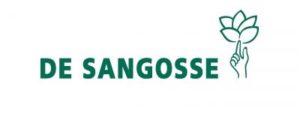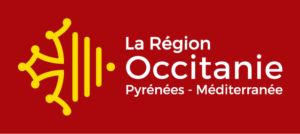
Thomas REY
Responsable Programme de Recherche Biosolutions, De Sangosse
reyt@desangosse.com

Sebastien ROY
Responsable Programme de Recherche Biosolutions, De Sangosse
sebastien.roy@univ-tlse3.fr

Aurélien AMIEL
Chargé de recherche en biochimie d’extraits végétaux et microbiens, De Sangosse
aurelien.amiel@univ-tlse3.fr

Alexandra HAOUY
Chargée de Recherche en Biologie Végétale et Microbienne, De Sangosse
alexandra.haouy@univ-tlse3.fr
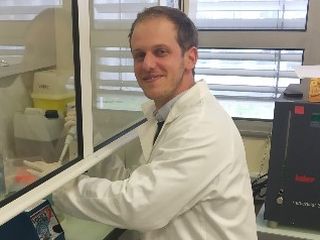
Rémi PENDARIES
Technicien Biotechnologies Végétales, De Sangosse
remi.pandaries@univ-tlse3.fr

Christophe ROUX
Responsable d'équipe, Professeur PRCE, HDR, Université Toulouse 3 – Paul Sabatier
christophe.roux@univ-tlse3.fr

Bernard DUMAS
Directeur de Recherches, CNRS, HDR
bernard.dumas@univ-tlse3.fr

Guillaume BECARD
Professeur des Universités, HDR
guillaume.becard@univ-tlse3.fr

Elodie GAULIN
Maître de Conférences (HC), HDR, Université Toulouse 3 - Paul Sabatier
elodie.gaulin@univ-tlse3.fr
Mohamed Zouaoui
Ingénieur de Recherche – Université Toulouse 3 -Paul Sabatier
mohamed.zouaoui@univ-tlse3.fr

Benoit DANILO
Ingénieur d’Etude Université Toulouse 3 - Labcom
thomas.hoarau@univ-tlse3.fr
Thomas Hoarau
Ingénieur d’Etude Université Toulouse 3 - Labcom
benoit.danilo@univ-tlse3.fr
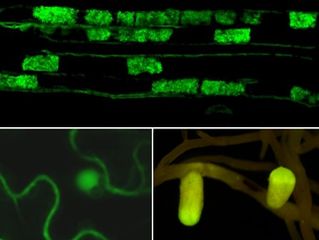
The BPP Students
Master, BTS, Licence
BioPlantProducts (BPP)
a joint lab between the LRSV and the companies
DE SANGOSSE SAS and Agronutrition
Plants live with a large community of microbes (microbiota) which is essential for their nutrition and health. Intensive agriculture, based on a massive use of chemical fertilizers and pesticides, has greatly contributed to the breakdown of the microbiological quality of soils, and therefore to the root microbiota.
The research carried out in the BioPlantProducts laboratory aims at identifying new microbial species/associations that optimize the action of the plant microbiota.
The future of agriculture will necessarily involve identifying new agronomic strategies that respect the environment and consumers in an agro-ecological approach. Among these strategies, the optimization of the soil microbial flora that develops in contact with the roots is a major objective. It is estimated that several million species of bacteria and fungi are present in a gram of soil, and that these microorganisms play a major role in the acquisition of nutrients and the fight against diseases. More than a century of massive use of chemical fertilizers and pesticides has depleted the microbiological balance of soils. One of the ways to optimize the functioning of soil microflora is to identify beneficial strains that stimulate plant nutrition and improve their resistance to disease. This is the objective pursued in the joint laboratory BioPlantProducts associating DE SANGOSSE group (the DE SANGOSSE SAS and Agronutrition affiliates), a successful company specialized in the development of formulations of plant protection and nutrition products and the LRSV, a recognized laboratory in plant sciences. BioPlantProducts brings to the company a strong scientific and technical expertise and offers to the LRSV the possibility to validate in the field concepts resulting from fundamental research on the mechanisms governing in particular the interactions between plants and microorganisms.
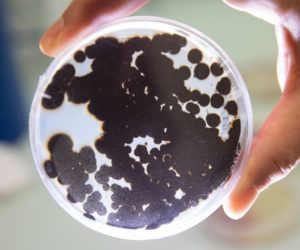 Collections of microoragnisms from selected genera are used in screening approaches to identify potential antimicrobial agents, plant defence stimulator or nutrient solubilizing strain. The efficacy of promising candidate is assessed in planta. We then combine genome mining, metabolomics and transcriptomics to study microbes of interests. These omics data help us to determine the taxonomic affiliations of microorganisms and identify key mechanisms underlying their effects on the plant. Such informations are important to foster technological transfer to agriculture by producing microbials based product used as innoculants, facilitate the registration process of the stain to reach the market and improve potential protection of the intellectual property of these technologies.
Collections of microoragnisms from selected genera are used in screening approaches to identify potential antimicrobial agents, plant defence stimulator or nutrient solubilizing strain. The efficacy of promising candidate is assessed in planta. We then combine genome mining, metabolomics and transcriptomics to study microbes of interests. These omics data help us to determine the taxonomic affiliations of microorganisms and identify key mechanisms underlying their effects on the plant. Such informations are important to foster technological transfer to agriculture by producing microbials based product used as innoculants, facilitate the registration process of the stain to reach the market and improve potential protection of the intellectual property of these technologies.
The scientific projects carried out in this laboratory mainly concern the research themes of the team « Microbial Interactions in Rhizosphere and Roots » (RHIZO) directed by C. Roux, in particular on the study of the activity of microbial strains of the rhizosphere involved in the regulation of the microbiota (Streptomyces, Pythium, bacteria « helpers » of mycorrhizae…) or promoting plant growth and nutrition (mycorrhizal fungi…). This research is performed by a mixed team of researchers, research assistants, PhD candidates and undergraduate students from both stakeholder.
The LabCom BPP, is coordinated for the LRSV by Bernard DUMAS and Christophe ROUX , and for the DE SANGOSSE group by Isabelle RETY-GUITTON and Valérie ARNAL
Publications
- The mycoparasite Pythium oligandrum induces legume pathogen resistance and shapes rhizosphere microbiota without impacting mutualistic interactions
- Maryam Hashemi, Aurélien Amiel, Mohamed Zouaoui, Kévin Adam, Hélène San Clemente, Marielle Aguilar, Rémi Pendaries, Jean-Malo Couzigou, Guillaume Marti, Elodie Gaulin, Sébastien Roy, Thomas Rey, Bernard Dumas
- Frontiers in Plant Science, 2023, 14, pp.1–17. ⟨10.3389/fpls.2023.1156733⟩
- DOI : 10.3389/fpls.2023.1156733
-


- Genome Sequence of the Streptomyces Strain AgN23 Revealed Expansion and Acquisition of Gene Repertoires Potentially Involved in Biocontrol Activity and Rhizosphere Colonization
- Damien D. Gayrard, Clément Nicolle, Marine Veyssière, Kévin Adam, Yves Martinez, Céline Vandecasteele, Marie Vidal, Bernard Dumas, Thomas Rey
- PhytoFrontiers, 2023, ⟨10.1094/PHYTOFR-11-22-0131-R⟩
- DOI : 10.1094/PHYTOFR-11-22-0131-R
-


Gayrard D, Veyssière M, Adam K, Martinez Y, Vandecasteele C, Vidal M, Dumas B, Rey T (2021) Genomic adaptation in the CAZyome and specialised metabolism of the plant-associated Streptomyces violaceusniger clade (2021). BioRxiv
DOI : 10.1101/2021.10.25.465742
Gavrin A, Rey T, Thomas TA , Toulotte J , Chatterjee A, Kaplan JL, Evangelisti E, Takagi H, Charoensawan V, Rengel D, Journet PE, Debellé F, de Carvalho-Niebel F, Terauchi R, Braybrook S, Schornack S (2020). Developmental modulation of root cell wall architecture confers resistance to an Oomycete pathogen. Curr Biol 2;30(21):4165-4176.e5.
DOI: 10.1016/j.cub.2020.08.011.
Vergnes S, Gayrard D, Veyssière M, Toulotte J, Martinez Y, Dumont V, Bouchez O, Rey T, Dumas B (2020) Phyllosphere colonisation by a soil Streptomyces promotes plant defense responses against fungal infection Mol Plant Microbe Interact 33:223-234
DOI: 10.1094/MPMI-05-19-0142-R
Faure C, Veyssière M, Boëlle B, San Clemente H, Bouchez O, Lopez-Roques C, Chaubet A, Martinez Y, Bezouška K, Suchánek M, Gaulin E, Rey T, Dumas B. (2020) Long-Read genome sequence of the sugar beet rhizosphere mycoparasite Pythium oligandrum. G3: Genes, Genomes, Genetics v
DOI: 10.1534/g3.119.40074
Camborde L, Raynaud C, Dumas B, Gaulin E. (2019) DNA-damaging effectors: new players in the effector arena. Trends Plant Sci 24:1094-1101
DOI: 10.1016/j.tplants.2019.09.012
Rey T, Dumas B. (2017) Plenty Is No Plague: Streptomyces symbiosis with crops. Trends Plant Sci 22:30-37
DOI : 10.1016/j.tplants.2016.10.008
Theses
Thèses en cours
Thèses soutenues
- Clément NICOLLE (2023) Mécanismes moléculaires de l’interaction d’une souche rhizosphérique de Streptomycesavec les racines des plantes
- Maryam HASHEMI (2022) Effect of mycoparasite and root endophyte Pythium oligandrum on plant root-microbe interactions
- Charlène FAURE (2020) Mécanismes cytologiques et moléculaires du pouvoir pathogène de Pythium oligandrum, oomycète mycoparasite
- Damien GAYRARD (2020) Activités stimulatrices des défense de plantes et antifongique d’une souche de Streptomyces sp. utilisée en tant qu’agent de biocontrôle
lrsv.gestion@univ-tlse3.fr
Phone
Standard : 05.34.32.38.01
Fax : 05.34.32.38.02
Find us
24, chemin de Borde-Rouge.
31320, Auzeville-Tolosane. FRANCE





